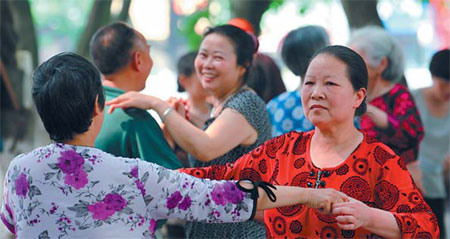Age-old question raises a retirement dilemma
 0 Comment(s)
0 Comment(s) Print
Print E-mail China Daily, June 25, 2012
E-mail China Daily, June 25, 2012
An inequitable system
The number of Chinese nationals aged 60 or above reached 185 million last year, accounting for 13.7 percent of the total population, according to statistics published by the China National Committee on Aging. By 2015, that figure will hit 221 million, 16 percent of the total population.
 |
|
Retired residents of Huaying city, Sichuan province, dance in a park on June 2. More than 10,000 city retirees attend dance events held by communities every day. |
The number of people in urban areas receiving a basic pension had soared to 283 million by the end of 2011, the Ministry of Human Resources and Social Security said in a recent report, and there were more than 68 million new pensioners, a rise of 5.21 million from 2010.
What's more, a joint study conducted by the Bank of China and Deutsche Bank suggested that the aging population will leave the country with a pension fund shortfall of 18.3 trillion yuan by 2013, creating a heavy fiscal burden, according to reports by Xinhua News Agency.
Yin Weimin, minister of human resources and social security, confirmed at a news conference in March that 13 provinces had pension fund shortfalls in 2011 and the fiscal budget had contributed roughly 180 billion yuan to offset them.
Yu Zhengsheng, the Party chief of Shanghai, told a meeting last year that the city would allocate more than 10 billion yuan in its annual budget to bridge the gap. Meanwhile, to offset the shortfalls, some local governments are using money from individual accounts and gradually depleting them, said Xu Yanjun, deputy director of the Social Insurance Administration under the Ministry of Human Resources and Social Security.
Taking those factors into account, if everyone in China worked an extra year, pension funds would be boosted by more than 4 billion yuan, while payments would be reduced by 16 billion yuan, according to calculations by Zheng Bingwen, head of the Global Pension Fund Research Center at the Chinese Academy of Social Sciences.
It sounds like a good deal, so why has it provoked such strong public opposition?
"The promotion of an extension to the retirement age should at least satisfy an essential precondition that our country can solve its historical pension debt smoothly through the fiscal system without depending on enterprises and individuals, but obviously, now is not the right time," said Zhang Zhanxin, an expert in social security studies at the Chinese Academy of Social Sciences.
A report released by Institute of Social Security under Renmin University of China in 2005 estimated that the government would have to pay 8 trillion yuan into the pension pot from 1997 to 2033.
Meanwhile, the China Pension Report 2011, conducted by CASS, showed that although government subsidization of pensions has increased rapidly since 1997 and the accumulated subsidies exceeded 1.25 trillion yuan by the end of 2011, but that's a drop in the ocean in the face of a debt shortfall of 8 trillion yuan.
"The government should solve the historical debt problem first so the public can see how pension funds were received and spent, otherwise the pension account will always be a mess," commented Zhang.






Go to Forum >>0 Comment(s)